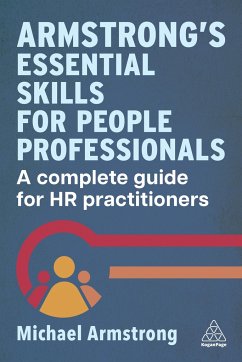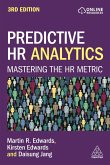Michael Armstrong
Armstrong's Essential Skills for People Professionals
A Complete Guide for HR Practitioners
26,99 €
inkl. MwSt.
Sofort lieferbar

13 °P sammeln
Michael Armstrong
Armstrong's Essential Skills for People Professionals
A Complete Guide for HR Practitioners
- Broschiertes Buch
- Merkliste
- Auf die Merkliste
- Bewerten Bewerten
- Teilen
- Produkt teilen
- Produkterinnerung
- Produkterinnerung
A complete guide to the skills needed for a successful career as a people professional.
Andere Kunden interessierten sich auch für
![Redefining HR Redefining HR]() Lars SchmidtRedefining HR26,99 €
Lars SchmidtRedefining HR26,99 €![Predictive HR Analytics Predictive HR Analytics]() Dr Martin EdwardsPredictive HR Analytics38,99 €
Dr Martin EdwardsPredictive HR Analytics38,99 €![Human Resources for the Non-HR Manager Human Resources for the Non-HR Manager]() Carol T. KulikHuman Resources for the Non-HR Manager42,99 €
Carol T. KulikHuman Resources for the Non-HR Manager42,99 €![Human Resources for the Non-HR Manager Human Resources for the Non-HR Manager]() Carol T. KulikHuman Resources for the Non-HR Manager176,99 €
Carol T. KulikHuman Resources for the Non-HR Manager176,99 €![Radical Candor Radical Candor]() Kim ScottRadical Candor20,99 €
Kim ScottRadical Candor20,99 €![Data-Driven HR Data-Driven HR]() Bernard MarrData-Driven HR125,99 €
Bernard MarrData-Driven HR125,99 €![Data-Driven HR Data-Driven HR]() Bernard MarrData-Driven HR31,99 €
Bernard MarrData-Driven HR31,99 €-
-
-
A complete guide to the skills needed for a successful career as a people professional.
Hinweis: Dieser Artikel kann nur an eine deutsche Lieferadresse ausgeliefert werden.
Hinweis: Dieser Artikel kann nur an eine deutsche Lieferadresse ausgeliefert werden.
Produktdetails
- Produktdetails
- Verlag: Kogan Page Ltd
- Seitenzahl: 264
- Erscheinungstermin: 3. April 2024
- Englisch
- Abmessung: 235mm x 159mm x 22mm
- Gewicht: 410g
- ISBN-13: 9781398614765
- ISBN-10: 1398614769
- Artikelnr.: 68930386
- Herstellerkennzeichnung
- Libri GmbH
- Europaallee 1
- 36244 Bad Hersfeld
- gpsr@libri.de
- Verlag: Kogan Page Ltd
- Seitenzahl: 264
- Erscheinungstermin: 3. April 2024
- Englisch
- Abmessung: 235mm x 159mm x 22mm
- Gewicht: 410g
- ISBN-13: 9781398614765
- ISBN-10: 1398614769
- Artikelnr.: 68930386
- Herstellerkennzeichnung
- Libri GmbH
- Europaallee 1
- 36244 Bad Hersfeld
- gpsr@libri.de
Michael Armstrong is the UK's bestselling author of Human Resource Management books including Armstrong's Handbook of Human Resource Management Practice, Armstrong's Handbook of Strategic Human Resource Management, Armstrong's Handbook of Reward Management Practice and Armstrong's Handbook of Performance Management and several other titles published by Kogan Page. His books have sold over a million copies and have been translated into twenty-one languages. Michael Armstrong is a Companion and former Chief Examiner of the Chartered Institute of Personnel and Development (CIPD), a managing partner of E-Reward and an independent management consultant. Prior to this he was an HR director of a publishing company. He is based in London, UK.
Chapter
00: Introduction: the nature of skill Section
ONE: PEOPLE MANAGEMENT SKILLS: THE FRAMEWORK Chapter
01: The role of people management; Chapter
02: The skills of people management professionals; Section
TWO: PEOPLE MANAGEMENT PROCESS SKILLS Chapter
03: Strategic people management skills; Chapter
04: Business partnering skills; Chapter
05: Organization development skills; Chapter
06: Change management skills; Chapter
07: Skills analysis; Chapter
08: Selection interviewing skills; Chapter
09: Learning and development skills; Chapter
10: Reward management skills; Section
THREE: ANALYTICAL, TECHNICAL AND RESEARCH SKILLS Chapter
11: Analytical and diagnostic skills; Chapter
12: Critical thinking skills; Chapter
13: Evidence
based people management skills; Chapter
14: People analytics skills; Chapter
15: Problem
solving skills; Chapter
16: Decision
making skills; Chapter
17: Systems thinking skills; Chapter
18: Digital skills; Chapter
19: Statistical skills; Chapter
20: Research sklls; Section
FOUR: PERSONAL SKILLS Chapter
21: Communicating skills; Chapter
22: Report
writing skills; Chapter
23: Speaking skills; Chapter
24: Listening skills; Chapter
25: Influencing skills; Chapter
26: Negotiating skills; Chapter
27: Leadership skills; Chapter
28: Consulting skills; Section
FIVE: PEOPLE SKILLS Chapter
29: Handling people problems; Chapter
30: Handling challenging conversations; Chapter
31: Political skills; Chapter
32: Managing conflict Section
SIX: BUSINESS SKILLS Chapter
33: Understanding the business; Chapter
34: Enhancing performance skills; Chapter
35: Administrative skills; Chapter
36: Project management skills
00: Introduction: the nature of skill Section
ONE: PEOPLE MANAGEMENT SKILLS: THE FRAMEWORK Chapter
01: The role of people management; Chapter
02: The skills of people management professionals; Section
TWO: PEOPLE MANAGEMENT PROCESS SKILLS Chapter
03: Strategic people management skills; Chapter
04: Business partnering skills; Chapter
05: Organization development skills; Chapter
06: Change management skills; Chapter
07: Skills analysis; Chapter
08: Selection interviewing skills; Chapter
09: Learning and development skills; Chapter
10: Reward management skills; Section
THREE: ANALYTICAL, TECHNICAL AND RESEARCH SKILLS Chapter
11: Analytical and diagnostic skills; Chapter
12: Critical thinking skills; Chapter
13: Evidence
based people management skills; Chapter
14: People analytics skills; Chapter
15: Problem
solving skills; Chapter
16: Decision
making skills; Chapter
17: Systems thinking skills; Chapter
18: Digital skills; Chapter
19: Statistical skills; Chapter
20: Research sklls; Section
FOUR: PERSONAL SKILLS Chapter
21: Communicating skills; Chapter
22: Report
writing skills; Chapter
23: Speaking skills; Chapter
24: Listening skills; Chapter
25: Influencing skills; Chapter
26: Negotiating skills; Chapter
27: Leadership skills; Chapter
28: Consulting skills; Section
FIVE: PEOPLE SKILLS Chapter
29: Handling people problems; Chapter
30: Handling challenging conversations; Chapter
31: Political skills; Chapter
32: Managing conflict Section
SIX: BUSINESS SKILLS Chapter
33: Understanding the business; Chapter
34: Enhancing performance skills; Chapter
35: Administrative skills; Chapter
36: Project management skills
Chapter
00: Introduction: the nature of skill Section
ONE: PEOPLE MANAGEMENT SKILLS: THE FRAMEWORK Chapter
01: The role of people management; Chapter
02: The skills of people management professionals; Section
TWO: PEOPLE MANAGEMENT PROCESS SKILLS Chapter
03: Strategic people management skills; Chapter
04: Business partnering skills; Chapter
05: Organization development skills; Chapter
06: Change management skills; Chapter
07: Skills analysis; Chapter
08: Selection interviewing skills; Chapter
09: Learning and development skills; Chapter
10: Reward management skills; Section
THREE: ANALYTICAL, TECHNICAL AND RESEARCH SKILLS Chapter
11: Analytical and diagnostic skills; Chapter
12: Critical thinking skills; Chapter
13: Evidence
based people management skills; Chapter
14: People analytics skills; Chapter
15: Problem
solving skills; Chapter
16: Decision
making skills; Chapter
17: Systems thinking skills; Chapter
18: Digital skills; Chapter
19: Statistical skills; Chapter
20: Research sklls; Section
FOUR: PERSONAL SKILLS Chapter
21: Communicating skills; Chapter
22: Report
writing skills; Chapter
23: Speaking skills; Chapter
24: Listening skills; Chapter
25: Influencing skills; Chapter
26: Negotiating skills; Chapter
27: Leadership skills; Chapter
28: Consulting skills; Section
FIVE: PEOPLE SKILLS Chapter
29: Handling people problems; Chapter
30: Handling challenging conversations; Chapter
31: Political skills; Chapter
32: Managing conflict Section
SIX: BUSINESS SKILLS Chapter
33: Understanding the business; Chapter
34: Enhancing performance skills; Chapter
35: Administrative skills; Chapter
36: Project management skills
00: Introduction: the nature of skill Section
ONE: PEOPLE MANAGEMENT SKILLS: THE FRAMEWORK Chapter
01: The role of people management; Chapter
02: The skills of people management professionals; Section
TWO: PEOPLE MANAGEMENT PROCESS SKILLS Chapter
03: Strategic people management skills; Chapter
04: Business partnering skills; Chapter
05: Organization development skills; Chapter
06: Change management skills; Chapter
07: Skills analysis; Chapter
08: Selection interviewing skills; Chapter
09: Learning and development skills; Chapter
10: Reward management skills; Section
THREE: ANALYTICAL, TECHNICAL AND RESEARCH SKILLS Chapter
11: Analytical and diagnostic skills; Chapter
12: Critical thinking skills; Chapter
13: Evidence
based people management skills; Chapter
14: People analytics skills; Chapter
15: Problem
solving skills; Chapter
16: Decision
making skills; Chapter
17: Systems thinking skills; Chapter
18: Digital skills; Chapter
19: Statistical skills; Chapter
20: Research sklls; Section
FOUR: PERSONAL SKILLS Chapter
21: Communicating skills; Chapter
22: Report
writing skills; Chapter
23: Speaking skills; Chapter
24: Listening skills; Chapter
25: Influencing skills; Chapter
26: Negotiating skills; Chapter
27: Leadership skills; Chapter
28: Consulting skills; Section
FIVE: PEOPLE SKILLS Chapter
29: Handling people problems; Chapter
30: Handling challenging conversations; Chapter
31: Political skills; Chapter
32: Managing conflict Section
SIX: BUSINESS SKILLS Chapter
33: Understanding the business; Chapter
34: Enhancing performance skills; Chapter
35: Administrative skills; Chapter
36: Project management skills







